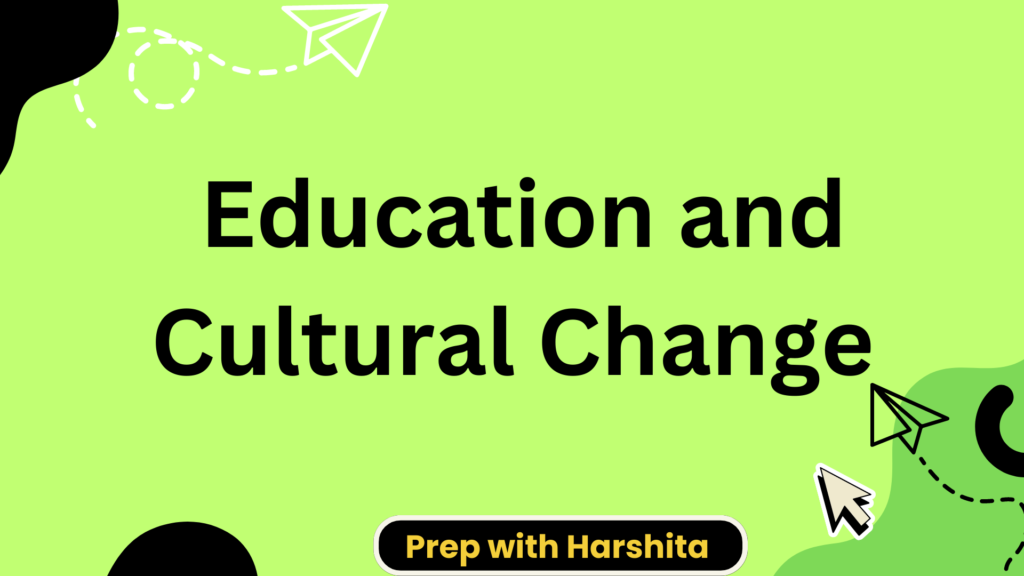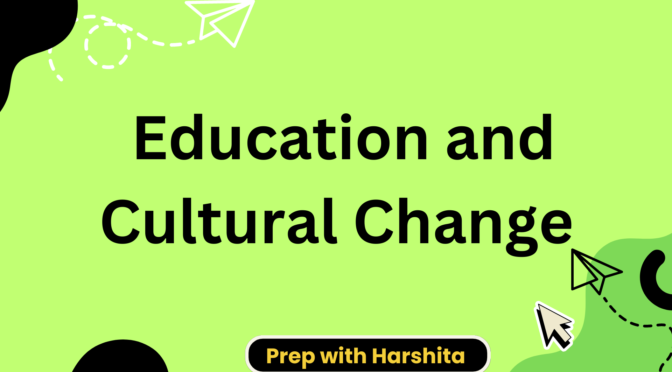Education plays a crucial role in driving cultural change and shaping societies. Education and cultural change are related. It is through education that knowledge, values, attitudes, and skills are transmitted from one generation to another, influencing the way people think, behave, and interact with each other.
Cultural change, on the other hand, refers to the transformation of beliefs, practices, and norms within a society over time.
Here are some ways education can contribute to cultural change:
- Transmission of Knowledge and Values: Education serves as a vehicle for transmitting knowledge, traditions, and cultural values from one generation to another. Schools and educational institutions play a vital role in imparting core knowledge and cultural literacy. Through formal and informal education, individuals learn about their cultural heritage, history, literature, arts, and other aspects that shape their identity and sense of belonging.
- Cultural Awareness and Appreciation: Education exposes individuals to diverse cultures, fostering an understanding and appreciation for different traditions, languages, customs, and perspectives. By including multicultural content in curricula and promoting cultural exchange programs, education encourages students to embrace diversity, challenge stereotypes, and develop intercultural competence.
- Socialization and Norms: Education plays a significant role in socializing individuals and reinforcing cultural norms and values. In schools, students learn societal expectations, ethical values, and behavioral standards. However, education can also be a catalyst for questioning and challenging existing norms, particularly when it encourages critical thinking and open dialogue.
- Gender and Equality: Education has a profound impact on gender roles and equality. By providing equal educational opportunities for all genders, education can empower women and challenge traditional gender norms. Education can promote gender equality by teaching about women’s contributions to society, challenging stereotypes, and fostering an environment that encourages both boys and girls to pursue their interests and aspirations.
- Skills for Cultural Adaptation: In a globalized world, education equips individuals with the skills necessary to navigate cultural diversity and adapt to changing circumstances. Through education, individuals learn to communicate effectively across cultures, develop intercultural sensitivity, and embrace new ideas and perspectives. This prepares them to be culturally competent global citizens who can contribute positively to multicultural societies.
- Critical Thinking and Cultural Change: Education encourages critical thinking, which is essential for cultural change. By teaching students how to analyze, question, and evaluate information, education fosters independent thought and the ability to challenge existing cultural norms and practices. Critical thinking skills enable individuals to envision alternative futures, propose innovative ideas, and advocate for cultural change.
- Innovation and Creativity: Education plays a significant role in fostering creativity and innovation, which can lead to cultural transformation. By providing opportunities for exploration, problem-solving, and creative expression, education nurtures individuals. They can challenge the status quo and introduce new ideas, practices, and technologies. Educational institutions that emphasize innovation and entrepreneurship contribute to cultural change by fostering a culture of creativity and adaptability.
- Education and Social Movements: Throughout history, education has been closely intertwined with social movements and cultural change. Educational institutions have often served as breeding grounds for activism, where students mobilize for causes such as civil rights, environmentalism, and social justice. Education can provide the knowledge, skills, and platforms necessary for individuals to organize, advocate, and effect change within their societies.
It is important to recognize that education is not the sole driver of cultural change. Factors such as technological advancements, media influence, political developments, and economic shifts also play significant roles. Nonetheless, education remains a powerful tool for nurturing informed citizens, promoting cultural understanding, and instigating positive cultural change within societies.
Also Read: Core Curriculum

Also Visit: Prep with Harshita


One thought on “Education and Cultural Change”